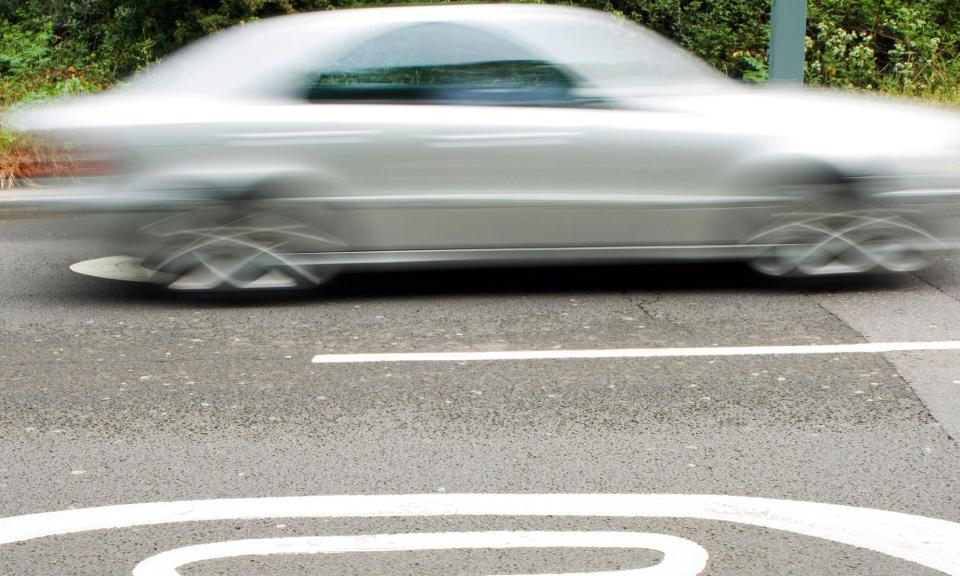‘Hard to argue against’: mandatory speed limiters come to the EU and NI

In the highway code and the law courts, there is no doubt what those big numbers in red circles mean. As a quick trip up any urban street or motorway with no enforcement cameras makes clear though, many drivers still regard speed signs as an aspiration rather than a limit.
Technology that will be required across Europe from this weekend may change that culture, because from 7 July all new cars sold in the EU and in Northern Ireland must have a range of technical safety features fitted as standard. The most notable of these is intelligent speed assistance – or colloquially, a speed limiter.
The rest of the UK is theoretically free, as ministers once liked to put it, to make the most of its post-Brexit freedoms, but the integrated nature of car manufacturing means new vehicles here will also be telling their drivers to take their foot off the accelerator. Combining satnav maps with a forward camera to read the road signs, they will automatically sound an alarm if driven too fast for the zone they are in.
Drivers of most new cars will be familiar with similar features already installed, but they are currently easy to override. According to a representative at one large manufacturer: “You’ve got to balance whether it makes the car safer – but it’s driving people mad. In practice, we’re finding that a lot of people are switching it all off.”
From now on, however, cars will be designed with systems that are impossible to permanently turn off, restarting each time the engine does. Will car lovers see this as pure progress?
“It’s one of those things that it’s very difficult to argue against,” says Steve Fowler, an automotive consultant and former editor of Autocar. “Sticking to speed limits is not only is going to save you in no end of ways, it’s going to potentially save lives.”
Safety is the overriding reason for slower speeds, and as charities such as Brake and Rospa emphasise, even small increases above 30mph make a significant difference in outcomes, particularly for those who are not driving the car.
Related: First hands-free self-driving system approved for British motorways
Yousif Al-Ani, the principal engineer for advanced driver assistance systems (ADAS) at Thatcham Research, says: “Modern vehicles are very good at protecting occupants in the event of a collision through passive safety features, such as airbag and crumple zones, but these have limited benefit to vulnerable road users” such as pedestrians and cyclists.
The number of road deaths involving a speeding vehicle in Britain has risen faster than the wider toll since Covid, up 20% in 2022 to 303 out of 1,695.
A significant minority of drivers admite to break speed limits on all types of roads, but observation of free-flowing traffic by the Department for Transport suggests the proportions are higher. According to the RAC’s 2023 report on motoring, 57% of drivers said they broke the 70mph speed limit on motorways. The 30mph in most urban areas was most likely to be respected, broken by only 40%. The DfT found that on 20mph roads with free-flowing traffic – not residential streets with speed bumps - between 80 and 90% of vehicles flouted the limit.
One of the most common asssertions speeders made to the RAC was that “I drive at the speed of other road users”. That kind of peer pressure may be no surprise to those struggling to observe 20mph limits on, for example, bigger roads in London or Wales, as following drivers display furious incredulity; or on roads such as the M6 toll, where many appear to regard the £9.70 charge as buying the right to bomb past at 80mph as much as dodge Birmingham.
With the precise readings of computers replacing wobbly speedometer needles, however, and a new generation of speed cameras upping the ante on the enforcement side, it may be ever harder to disown responsibility. Lawyers say those who switch off the speed limiter at the start of their journey may have a difficult time if they end up in court.
As well as the limiter, other ADAS features, including automated lane-keeping and autonomous emergency braking, will become mandatory. Questions remain over whether the technology works well enough in all real-life situations, and how comfortable people will feel with their car telling them what to do, let alone taking control of their steering, brakes and acceleration – a potentially alarming and disorienting experience.
“Striking a balance between safety, performance and integration to create systems that cooperate with drivers is a real challenge for manufacturers,” says Al-Ani.
The consensus, however, is that the benefits far outweigh the risk. More and more drivers are happy to go slower and rely on the technology, Fowler says. “Driving is changing, and I think drivers are changing. Much as it pains me to say this, they don’t necessarily love the sort of things that enthusiasts in the past have loved, the engineering that goes into them.
“People are more aware that driving faster uses more fuel. If you’re doing 80 on the motorway, it exponentially increases.”
With the rising cost of living focusing minds on the miles per gallon as much as the speed, the joy can be in driving well rather than fast, Fowler said. “We need to breed a new generation of drivers who find driving in a more relaxed manner can be just as rewarding. Driving well, so you can keep momentum going, not having to stop and start all the time, will save you fuel, save your money, save on emissions. Maybe mpg is the new mph.”

 Yahoo Finance
Yahoo Finance 